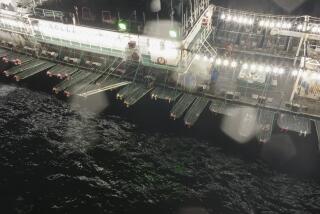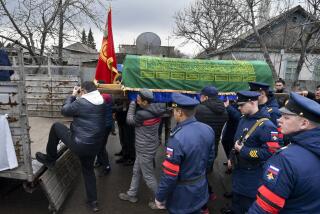Pay Is High, but Soviet Island Is Cold, Isolated : Sakhalin: No Worker’s Paradise
YUZHNO SAKHALINSK, Soviet Union — Even wages that are double what they pay in Moscow are not enough to attract workers to fill all the jobs on Sakhalin, the big island off the Soviet Pacific coast.
For Sakhalin is no resort. It is plagued by hurricanes and severe weather. Ice and snow are a problem for eight months of the year.
In January, for instance, a blizzard cut off communications with the mainland and halted all outdoor work and activity. Only emergency vehicles trailing behind snow plows were allowed on the roads, and most people were ordered to stay home until the emergency passed.
Also, like other places in the maritime provinces, Sakhalin has an acute housing shortage, despite an apartment-building campaign.
There are 700,000 people on the island and 70,000 in this city, and many of them still live in drafty wooden houses that were built when the Japanese governed the southern half of the island, from 1905 until the end of World War II in 1945.
Still, there are advantages. The labor shortage makes it possible for young people to move up quickly to top jobs, and their relative affluence affords them a higher standard of living than most of their countrymen have.
There is direct, daily Aeroflot airline service to Moscow, nine hours away by air, and this helps reduce the sense of isolation.
Sensitive Frontier Region
Sakhalin has long been regarded as a sensitive frontier region. It is an important oil-producing area, dotted with military installations, and it is off-limits to most foreigners. But this reporter, accompanied by local officials, was recently given a rare look at parts of it.
The officials said they had recently announced a 10% pay increase in an effort to attract new workers and to encourage people already here to stay. Sakhalin’s workers get 12 additional days of annual vacation, plus air fare to any place in the country once every three years.
Nevertheless, a recent issue of Sakhalin’s principal newspaper listed openings for a wide variety of jobs--slaughterhouse workers, retail store managers, construction engineers, airline stewardesses.
Mikhail L. Petrukhin, deputy chairman of Sakhalin’s local government, said that with the bonus paid for working in such a harsh climate, industrial wages now average 427 rubles a month, or more than twice the national average. (With the ruble worth about $1.55 at the official exchange rate, that is the equivalent of about $662.)
In-migration and out-migration, he said, have stabilized at about 5% a year, and he said that recruiting enough people to fill all the jobs is only a “small problem.”
The relatively high pay is an important factor.
Valentin L. Zvezdov, acting director of a state farm near here, said the farm’s 1,000 or so workers average between 600 rubles ($930) and 700 rubles ($1,085) a month.
And these figures, he said, do not take into account their income from what they can grow on private plots, which can increase their income by as much as 1,000 rubles ($1,550) a month in the summer. Nationally, the pay of farm workers is about 150 rubles ($232.50) a month.
The farm workers’ average age is under 40, Zvezdov said, and “every fourth family has a car.” He said his people could buy even more cars but that “we don’t get enough cars here.”
Arkady V. Kukin, who was recently named deputy chairman of the city government of Kholmsk, a seaport with a population of 55,000 across the island from Yuzhno Sakhalinsk, said that income there has doubled in the last 10 years but that housing continues to be a “massive problem.”
Because of his background as a construction engineer, Kukin has been assigned to supervise the completion of 31 apartment buildings designed to relieve the shortage.
There was a time, he said, when the people of Sakhalin were satisfied with an apartment of any kind, but now they demand not only more space but hot water and electric stoves as well.
Many of the older wooden houses on the island, complete with large gardens, are occupied by Koreans, who make up about 5% of the population. According to Soviet officials, the Koreans were forced by the Japanese to settle here in the 1930s, and they stayed on after the Japanese left at the end of World War II.
“Their gardens are so bountiful that they rival some of our collective farms,” one admiring Russian observed. “The Koreans are real businessmen.”
The island’s fishermen are prosperous, too. They account for 10% of the Soviet catch and take in an average of about 600 rubles a month each--up to 1,000 when bonuses are included.
Whatever their income, most of the islanders have a problem in that there are not many places to spend their money. Some of the better-paid workers, especially single people, like to dine on seafood at the Neptune Restaurant, where dinner and drinks runs about 25 rubles.
Capt. Michael Romanovski, the new chief of the Sakhalin Shipping Line, which runs a ferry service between Kholmsk and the mainland port of Vanino, said he started out as a seaman in the Soviet maritime service. He worked his way up to captain before coming ashore as an executive.
Four Months’ Vacation
Sailors on the ferry boats work for four months and then take four months off, a schedule that they themselves suggested. Capt. Gennady V. Cavelov said he loves it.
“You can do whatever you want for four months and still get paid for it,” he said.
Capt. Romanovski said pay increases ranging from 15% to 20% will go into effect this year as part of a plan to reduce labor turnover in the Far East. Dock workers already get up to 600 rubles a month, he said, and sailors average between 350 and 400 rubles, plus a bonus of two- or three months’ pay at the end of the year.
“It’s twice as high as Moscow pay, but no one comes from Moscow to work here,” he said. “The people who do come, and stay for more than two or three years, usually stay forever.”
More to Read
Sign up for Essential California
The most important California stories and recommendations in your inbox every morning.
You may occasionally receive promotional content from the Los Angeles Times.









